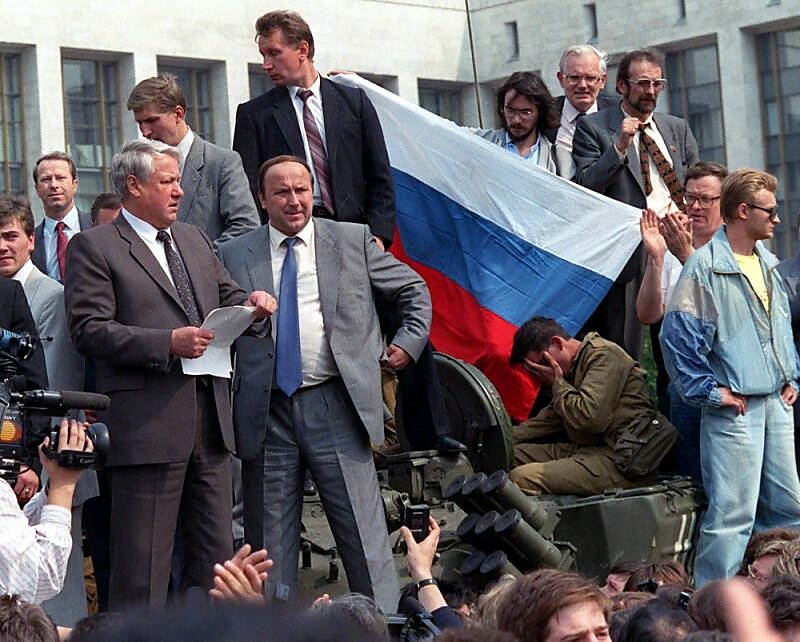Twenty-five years ago today I was driving back to Boston from Cape Cod. Two stories dominated the radio news that morning. Hurricane Bob was headed straight for New England, putting my return to Washington in doubt. And Russian hard-liners had staged a coup against Mikhail Gorbachev, who was being held incommunicado in his dacha in Crimea. Eventually I got back to Washington, by a very slow train rather than by plane. The other story had more lasting consequences.
On that morning of August 19, 1991, as the coup plotters issued a declaration of a new Soviet president and seized control of Russian media, supporters of democracy gathered at the Russian parliament. And Boris Yeltsin, the new president of the Russian Soviet Socialist Federal Republic, decided to go out and speak to the soldiers and people outside the parliament building. He climbed up on a tank and rallied opposition to the coup. Two days later it collapsed, and Yeltsin was a national hero. As I wrote when Yeltsin died in 2007:
More than any other man, Boris Yeltsin moved the Russian people from tyranny to a rough approximation of freedom. For that he is one of the authentic heroes of the 20th century.
In a way he personalizes Mikhail Gorbachev’s accidental liberation of the Russian and Soviet people. Gorbachev intended to reform and reinvigorate communism. He brought Yeltsin from the rural region of Sverdlovsk in 1985 to shake up the stagnant party as the Moscow party boss. But Gorbachev set in motion forces that he couldn’t contain. Once people were allowed to criticize the communist system and glimpse an alternative, things moved rapidly–partly because of Yeltsin’s unexpectedly radical leadership.
Two years later Gorbachev and the party hierarchy pushed him out of the Politburo. But he turned around and ran for the Congress of People’s Deputies, won, and then was elected to the Supreme Soviet. He created Russia’s first parliamentary opposition (in the Supreme Soviet) and then won election to the new Russian parliament. Against the continuing opposition of Gorbachev, he was elected to the chairmanship of that body, thus becoming president of the Russian Soviet Federative Socialist Republic. He stunned politicos by resigning from the Communist Party.
And then in 1991, less than four years after being pushed out of politics by Gorbachev, Boris Yeltsin became the first elected leader in a thousand years of Russian history, winning a popular election for president. Six weeks later he hit his high point. When hard-line communists tried to stage a coup, Yeltsin courageously raced to parliament to rally opposition. He jumped on a tank to address the crowd, creating one of the iconic images of the collapse of communism.
He went on to effectively dismantle the Soviet Union and to let 14 of the Soviet republics go their own way. He set about freeing prices and privatizing state property, the largest privatization in the history of the world. It was far from an ideal privatization process. But there weren’t many models for wholesale transformation of a communist economy into a market economy. As I wrote in 2007,
Yeltsin wasn’t perfect. He was often boorish and apparently had an excessive taste for alcohol. Despite letting the other Soviet republics go, he launched the devastating war in Chechnya. He unconstitutionally dissolved parliament in 1993; when communist lawmakers defied him, he sent tanks to shell parliament. But it should be noted that Yeltsin at that time was seeking to defend liberal democracy against a return to communism. Imagine if Nazi legislators had stayed in the German parliament into 1949, resisting Adenauer’s policies and threatening to bring back National Socialism. Would it be undemocratic to call out the military to counter them? Fareed Zakaria’s worry in 1997 that Yeltsin’s creation of a “Russian super-presidency” might be abused by his successors looks all too prescient now. But a reversion to communism would have been worse.
And finally, after becoming the first elected leader in Russia’s history, he became something even more important–the first Russian leader to voluntarily give up power. True, he turned Russia over to Vladimir Putin, making him more like Ronald Reagan, who delivered the United States to the Bushes, than George Washington, who left us in the capable hands of John Adams and Thomas Jefferson.
Still, the words that President Reagan addressed the American soldiers who invaded Normandy could also be applied to Boris Yeltsin: “These are the champions who helped free a continent. These are the heroes who helped end a war.”
For all his mistakes, Yeltsin helped to free a continent and end the Cold War. And 25 years ago today was his finest hour.

